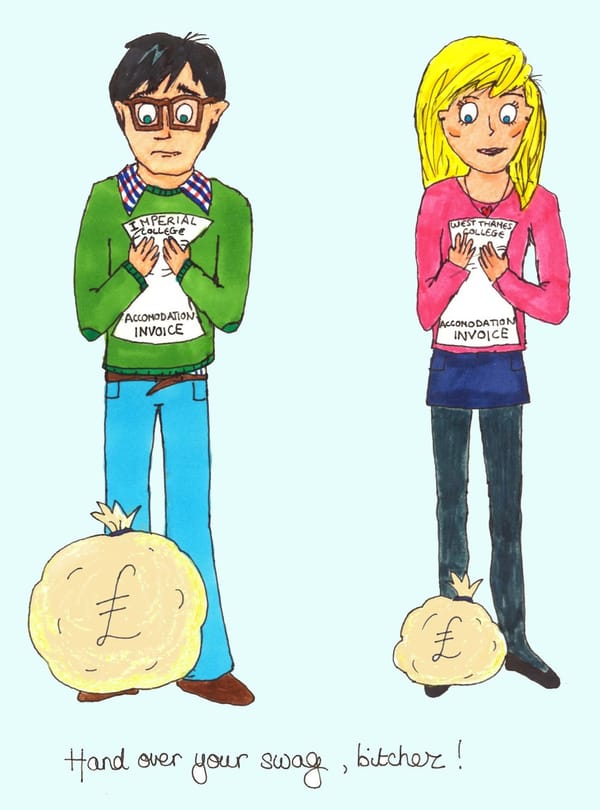Unseen Imperial – Depression: the stigmatised illness
Jonathan London on depression

What is Unseen Imperial?
Unseen Imperial is a project that aims to talk about the things that we don’t really feel comfortable about, but they are there if you scratch the surface. Mental health, discrimination, bullying; all the things that sometimes we pretend aren’t happening right under our noses. It is a forum/campaign/discussion – whatever you want to call it, a project to get people talking about these ‘uncomfortable’ issues so that hopefully work can be done as a community towards de-stigmatising them. – Becky Lane, Deputy President (Welfare)
It can strike anyone at any time in their life. The percentage of students being diagnosed with it has more than doubled, to 21% , over the past ten years. Every year, it is partly responsible for half a million deaths worldwide, and every indication is that this number will only increase as time passes. Medically, it belongs to a group of conditions which are some of the least well understood on Earth, and socially, attitudes towards it are often still as backward as they were towards HIV in the late 1980s and early 90s. I am talking about depression, the most common mental illness out there, and sadly, one of those which to this day still carries the most social stigma.
Too many times one hears suicide attempts being labelled as “cries for help”, rather than being due to “real” depression. Often in fact, those applying these labels are the same people who would quite rightly be horrified by rape apologists making a claim that rapes are actually “made up”, or by religious extremists claiming that homosexuals can be “cured”. Indeed, as a society our awareness of depression and mental health issues in general, is so far out dated that it is often deemed socially acceptable to refer to individuals with severe clinical depression in a derogatory way, to call them “emo”, needing to “man up” (sexist much!?) or “pull themselves together”. As if, by telling someone going through a nervous breakdown or major depressive episode to make an effort to be more sociable, work harder or just act as if nothing is wrong is somehow to help them. Would you expect someone dying of pneumonia to get better if you told their immune system to pull itself together and man up? I hope not!
In fact, the stigma associated with depression runs far deeper. Having been medicated for depression, I now have a mark on my life history which for some careers would be viewed similarly to a black spot on your CRB. Taking a significant amount of sick leave due to having a depressive episode, no matter what anyone in human resources may try to tell you, is not viewed in the same way in corporate land as taking sick leave to recover from any other, more “real” illness. Why is that? Why is it that I, as someone who has suffered from depression, should fear a remission of symptoms, just in case my future boss thinks I am weak, or, worse, lazy! Why should I, as someone who for all intents and purposes is completely healthy (could lose a few pounds maybe??), have to explain myself if applying for a job at the home office, or any other role where I handle sensitive information. In short, why do we as a society find it so hard to treat people recovering from mental illness just like they were recovering from any other illness?
The obvious answer is that with more physical (don’t like using that word, but it will have to do) illnesses, the symptoms are clear and well defined. You vomit blood, you’re ill; no one is going to argue with that, no one will blame you for it. You shove a handful of pills in your mouth and try to down it with vodka before being brought to your senses by your girlfriend (ex, naturally) who then proceeds to tear the bottle out of your hand… that was a symptom of my condition; no one will argue with that, but you can’t quite see it in the same way can you?
Therein lies the problem. People must take some degree of responsibility for everything they do, regardless of whether they are mentally ill or not. However, if someone mentally ill commits a crime, you lock them up, but make sure you lock them up in a hospital, rather than a prison. We do this because we are aware that, even when we know a person, mental illness may cause us to no longer recognise that very individual, because of how it influences their behaviour. When I had my first, and hopefully last, depressive episode, it affected me in a way I cannot not adequately describe to someone who has not experienced it first-hand. How strongly it took hold me, how powerless I felt to do anything about it, and the state of mind I had to be in to consider death as a lovely holiday rather than something best avoided, no amount of poetry or literature can describe it. I was lucky to have had family and friends, almost all of whom stood by me during that time, who tried their best to understand what I was going through. However, I know many people are not so lucky.
It is for this reason that I have decided to write this article, after eventually stumbling across someone who had been through what I had, the day to day struggle of coping with my condition was made much more manageable, and so I am delighted to hear that Becky Lane (Deputy President (Welfare) for those of you that don’t know) is setting up a mental health awareness day in the near future, which I hope will also be an opportunity for like-minded(illness of the mind, like minded… get it?) individuals to come out of the woodwork and support each other. I also hope that if you know someone (if you don’t yet then one day you will), suffering from depression, you try to remember that the person they were before their episode isn’t gone, and you do your best to support them and be there for them while you wait for them to return to their normal selves, that is all anyone can ask.
And to anyone reading this who is currently suffering from depression, there is a light at the end of the tunnel… and it isn’t heaven. If you are really unlucky you will have to ride this out for half a year, most of you won’t have to wait much more than 3 months, so hang in there bro!
The figures about student depression don’t make for pleasant reading – but so many suffer in silence. I have so much admiration for the author of this piece for speaking out about his experiences without anonymity. For those of you reading this article who have experienced depression in the past or present, there are people and services available to help. In College there are the Counselling Service, your GP, your personal/senior tutor, the Union Advice Centre and the College Tutors (contacted by emailing college-tutors@imperial.ac.uk). There are also many organisations external to Imperial that can help you through your difficulties such as Nightline – a confidential listening service aimed specifically at students (0207 631 0101). Although I am sure at times depression can make you feel like the loneliest person in the world; with all these support services, there is no need to battle depression alone.
If you are passionate about mental health issues and delivering an important message to the Imperial community, get in touch with me by email on dpwelfare@imperial.ac.uk to join the Mental Health campaign group. Whether you feel passionate about combating the myths about depression, or lobbying College to increase their counselling provision; as a group our voice is louder. Want to contribute to Unseen Imperial? Either email Tim at felix@imperial.ac.uk or me at dpwelfare@imperial.ac.uk, whether you want to be anonymous or not will always be respected. – Becky Lane, Deputy President (Welfare)









